The boons and banes of living in Elephant Country
Close encounters with some of the world’s remaining Megafauna --- [Estimated reading time: 20 min.]
A few days ago, in the coolest hours of the morning at around 5am, Karn jolted awake to the distinctive sound of a wild elephant pushing his body through the dense vegetation on the border of our land, about 50m away from our house. When she woke me up a few seconds later, he was busy ripping off jackfruits from one of our most productive trees on the border of the property. The sounds of elephants feeding are unmistakable, loud but intermittent, as if the elephant pauses in between moves to listen.
The rustling of leaves, then the dull thump of a jackfruit hitting the ground. Silence. A short, crunching sound as he steps on the fruit to crush it, followed by another moment of silence. Then intermittent sloshing and munching, accompanied by a low, rumbling growl, as if he’s appreciating the taste. Then half a minute pause, before leaves rustle and another jackfruit hits the ground. Then the gradual moaning, creaking, cracking and splintering of a branch, as if in slow motion.
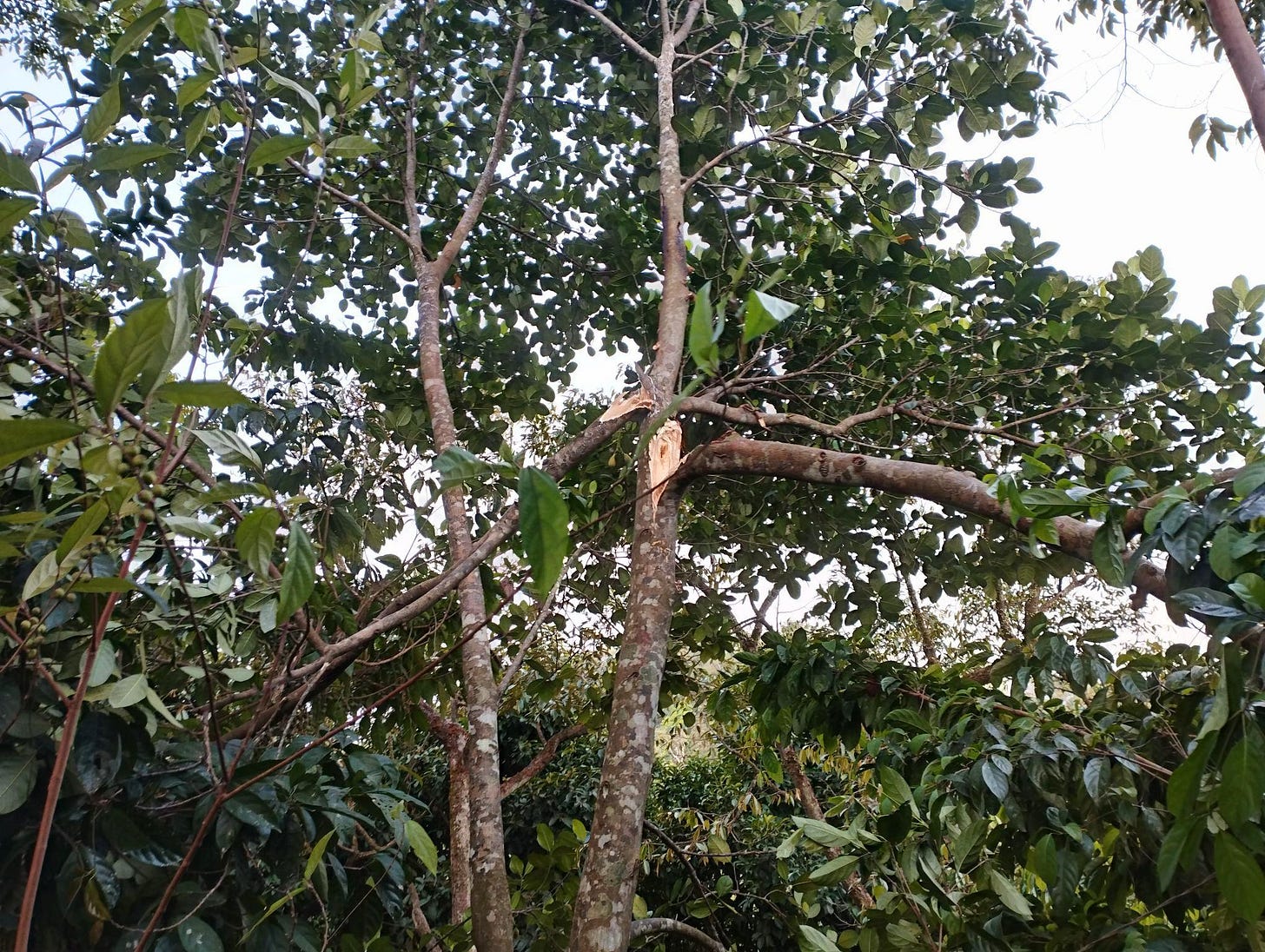
By now we were standing by the window, straining our eyes against the dark of the night to make out the massive shape among the trees. Who might it be? The bull from the next province that surprised us with a visit two years ago? Or someone entirely new to us? There is a certain kind of suspenseful excitement we feel in those moments, as we have no idea what might happen next. So far, elephant damage to our garden had remained at an absolute minimum, but we were well aware that this might not always be the case.
Which route is he going to take? Does he know the area well enough? If not, he might try to make a new path, which would be bad news for many of the trees – if he encounters an obstacle, he must circle around or try to push his way through. Both options would leave substantial marks on the land.
Truth be told, we were surprised that an elephant would venture out into the orchards at this time of the year, and we did not have the slightest clue which of the young bulls that usually frequent this area we were dealing with here.
At one point, just a few minutes later, the wind carried the distant puttering of an old motorbike to our ears. First vague, then louder and clearer, until its faint beam of light slowly crept up the steep road leading to our garden – as we watched with dread, expecting the worst. Elephants undoubtedly can be dangerous, especially when they feel annoyed, cornered, threatened, or angry, and especially when they are in musth (for males) or with a young calf (for females). Every year, about a dozen encounters between elephants and humans in Thailand end deadly for the latter, although the overall number of victims in this ongoing conflict skews heavily towards the other side.
The elephants are losing, and they know it.
Much to our surprise (and relief!), the motorbike continued its way up the hill unabated, neither stopping nor accelerating, its driver blissfully unaware of the close proximity of well over a ton of flesh and muscle, coordinated by a brain so large and complex it dwarfs our own.
There was a brief moment when we were unsure if it was really only one elephant, as it’s hard to tell from the noise alone. As always, we talked in a low, calm voice to the elephant, welcoming him, thanking him, and inviting him to eat whatever he pleases, without doing too much damage. “Please be careful,” we uttered each time there was another swishing or crackling sound as his massive body brushed along the vegetation.
At first, we thought he is going to circle widely around our house, as all previous visitors have. But, alas, a few minutes (and a few breaking branches) later, the elephant reached our humble abode, and – standing right next to it – started rummaging through the clutter beneath our house with his trunk, as if searching for something.
Then it hit us.
The day before, we had harvested a slimy-sweet “wet jackfruit” dripping with thick golden juice like honey, half of which we kept on our kitchen table1 under the house – the sweet scent must have been irresistible. And, as it turned out, we were right: it was this sugary snack that the elephant had put his mind on. After knocking over some buckets, he repeatedly bumped into the metal sheet roof that extends over the “outdoor living room” – a relatively recent addition to our house we built in anticipation of more (human) visitors. He seemed confused by its presence and initially attempted to walk underneath it, but it proved to be a little too low.
At this point we started suspecting that this was not an elephant from the next province,2 but one that remembers the paths through the mountains behind us well enough, despite not having walked them for many years. There is an ancient elephant path that cuts right through the middle of our garden, top to bottom, and before we moved here a mere seven years ago elephants could pass through entirely unconcerned. One local place name for our garden is ทางช้างลง (thang cháng long), “the path on which the elephants descend.”
Just three years ago, there was no protruding roof here, and hence there wasn’t one the last time this elephant had traveled along this path. He carefully groped his way along its edge, and around it through the vegetation, as we listened silently. The small mangosteen tree right in front of our house shook violently when he brushed against it, and I was sure that the vegetable bed next to it would be flattened – a real pity, since the cucamelons I’d planted there a month earlier were just starting to flourish.
It was now well after 5:30 am, and the very first faint glow of dawn made it possible to discern shapes. Enough to see that the elephant was standing literally right in front of us.
If it wasn’t for the thin barrier of our mosquito net, we could have reached out and touched his head.
We fell quiet, so as to not startle the elephant. Karn had her hands folded in front of her forehead in a waai, the submissive traditional Thai gesture of utter respect and devotion, silently pleading for him to be careful. I now half suspected that he might be in musth – the period of extremely elevated reproductive hormone levels, during which the bulls’ behavior is erratic, brazen and often rather reckless – but hoped that it was just his character, that he was one of the notorious bulls so accustomed to human contact that they’d lost most of their fear.
Eager as ever to satisfy his most immediate craving, he proceeded to reach around the hanging shelf just outside our kitchen, using his trunk to follow the scent and grab the oozing fruit right off our kitchen table, knocking down several bowls and our earthen rice pot in the process – while we were sitting less than a meter away in our bed (inside the blue mosquito net right above the shelf, visible in the picture below).
The loud clattering of the bowls and pots being wiped off the table startled one of our cats – who had taken refuge under our blanket – so much that, in an instant, she darted through the slit in the mosquito net, leaped out of the window, and disappeared into the dark garden (presumably racing up the lychee tree behind the house). Now it was only us and the elephant, who was still completely indifferent to our presenice.
Elephants have, in large part due to their enormous ears, an extremely keen sense of hearing, so he definitely heard us whispering and moving around in the house (at one point, a little earlier, we had accidentally knocked over some glass bottles on our way to the window), but he seemed entirely unconcerned – perhaps because he realized that we’re not a threat.
After some more slurping and squelching, accompanied by content grunts, he slowly backed away from the house, and turned to ascend the footpath leading to the chicken pen. Just a few steps further up the hill, he stumbled upon our largest coconut palm (seven years old, no fruit yet) – which we initially planted close to the house, thinking that the vicinity of a building would mean that it’s less likely to get eaten by elephants.
And, again, we were gently mocked, humbled by our Great Mother Earth and her giant, gray emissary. “Trees don’t belong to anyone,” the elephant grumbled as he caressed the palm fonds with his trunk.
Coconut palms (the soft “heart” of the palm, the inside of the growing shoot – not the coconuts themselves) are one of their favorite foods, which is why nobody in our village plants any more coconuts (many villagers even discouraged us from doing so as well, lest we will “attract elephants”). The last owner of our land had actually planted more than fifty coconut palms all over the place, only one of which remained when we took over twenty years later. Elephants will wait until the palms reach a good size – at around four to eight years age – and then rip out the edible part of the stem,3 killing the plant in the process.
By now we had gotten out of our bed and to the window in the next room, where we had a better view. Awe-struck, we watched as the elephant carefully peeled back fond after fond, right in front of us, until he revealed the innermost part of the shoot. He then gently wrapped his trunk around it, broke it off with a loud crackle, and complacently munched on it as he continued his ascend, dragging the youngest palm fonds behind him as he followed the path his ancestors had walked since time immemorial.
Now we were sure that, many years ago, this particular elephant had visited our place before: not only did he seem confused by the additional metal roof we installed as an extension to our outdoor kitchen, but he walked straight through our chicken fence (which we had to repair again the next day!), which also wasn’t there prior to us moving here.
There was a short, indignant burst of protest from the chickens as he pushed past the tree on which they were sleeping, and then the cracking, growling and rustling slowly grew more faint.
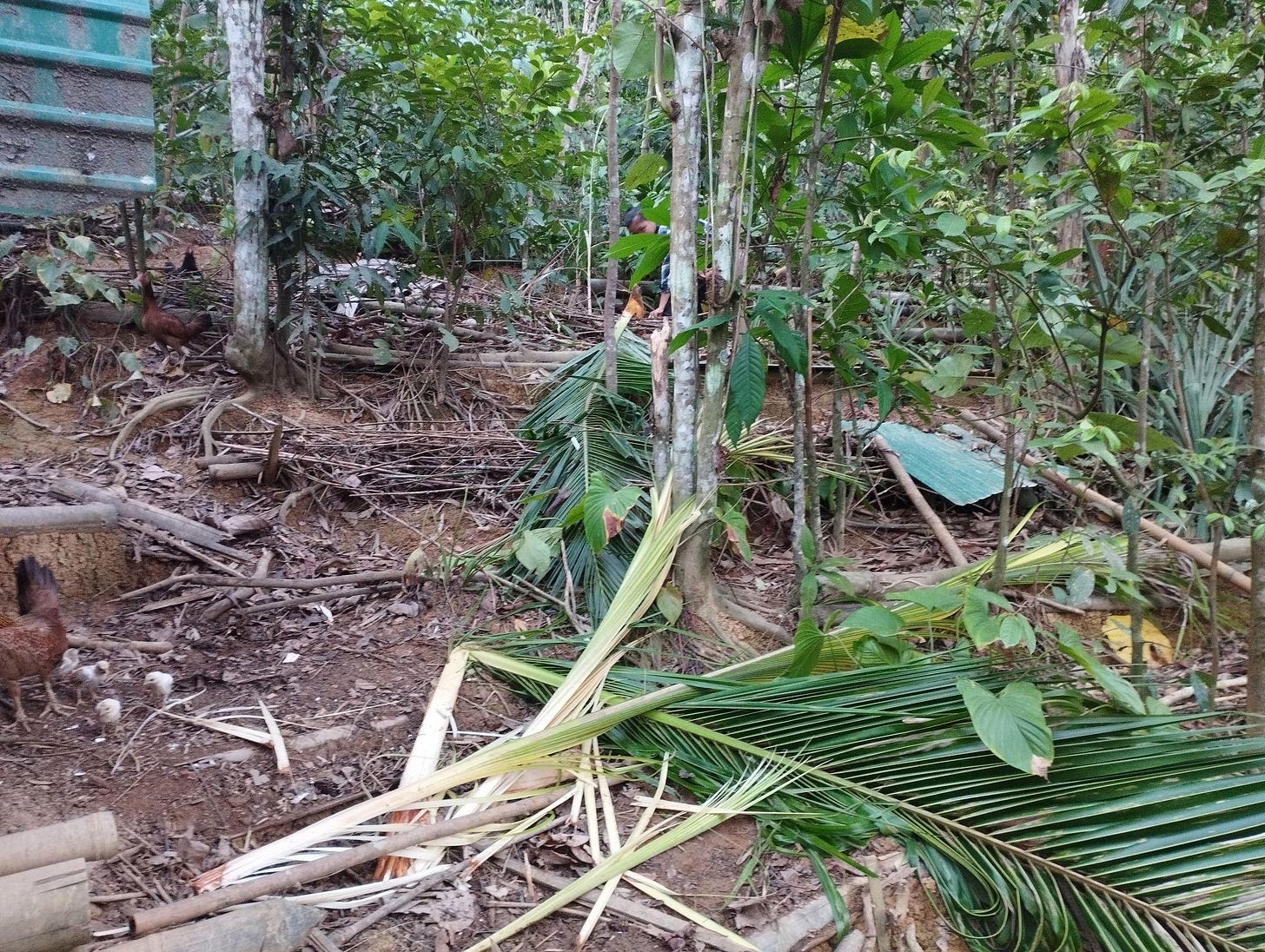
On our side of the valley most of the elephants are solitary younger males, who forage and roam this area alone until they assimilate into a larger group of males later in life. The elephant who visited us that day was a lot larger than the young bulls we usually see around here, but still a few years away from maturity. Usually, wild elephants pose no danger to humans whatsoever – at least if they don’t feel threatened. Most incidents resulting in injury or death for humans are caused by them frightening or provoking the elephants first. The only real risk factor for humans are elephants that are in musth, the reoccurring period of both heightened aggression and sexual desire following a sharp increase in reproductive hormones. Needless to say, during that time it is best to avoid them altogether.
On his way through the wilder top half of our garden he ate part of a fishtail palm trunk (leaving the palm heart for us to eat as a vegetable), and rubbed against a few smaller trees, knocking over a silk cotton tree the size of my thigh, before finally disappearing into the bamboo thicket.
After not being visited by an elephant for the entire last year (the first year without elephants since we moved here), we felt quite gloomy – a sobering reminder of the rampant human-elephant conflict that is ravaging elephant communities throughout the region. We took it as yet another symptom of the slowly unfolding Sixth Mass Extinction, directly caused by modern humans’ actions. Consequently, we read this most recent encounter as an overall good omen, a gleam of hope in times that seemingly get bleaker with each passing moon.
Needless to say, it is absolutely mind-blowing to be able to experience wild megafauna from up close – a truly life-changing experience – especially in the current age of catastrophic habitat loss and daily species extinctions. Curiously, we did not feel threatened or even unsafe at any point, just a bit worried about the damage one elephant’s trunk can do to an outdoor kitchen.4 And although I would lie if I said that we weren’t at least a little frightened by this up-close rendezvous, we knew that as long as we stayed inside our wooden stilt house, chances that the elephant will harm us are miniscule. We have encountered wild elephants often enough to know that they don’t tear down buildings, and they’re not out to hurt humans.
What we worried about much more was that the bustle would cause our neighbor to wake up, who would immediately light firecrackers or fire his gun into the air – which in turn might have caused the elephant to panic and run, or to get angry and charge. Both those scenarios might have ended badly for the garden, and perhaps even for us. Tellingly, the real danger for us was not the elephant himself, but our neighbor.5
But, to be honest: while the material damage was limited, the loss of our oldest coconut palm hurts. Especially Karn loves coconuts – one of the things we’re still missing from our own garden – and consequently she’s quite saddened by the loss of our largest coconut palm, which was like a child to her. Coconut palms grow quite slowly, and it takes about ten years for them to commence fruiting. We counted down the remaining years until we would finally be able to crack open our first homegrown coconut – but now this timer has been reset by a few years. Even more tragic is that we found several immature spadices (inflorescences) among the debris, indicating that the coconut palm was less than two years away from flowering for the first time.
But deep down we both expected that this might happen one day, and luckily plants are not irreplaceable. Our response will be to plant back at least five more coconut palms to compensate for the loss and ensure the future food supply of the local elephant population, as well as hopefully that of ourselves.
All things considered, we feel deeply honored by this visit, glad that the fruit of our labor helped one of the remaining wild elephants eat his fill for another day, and we sincerely hope the elephant won’t get into trouble with farmers who are less generous and understanding than us. As I’ve detailed before, farmers here are ruthless when it comes to deterring elephants, and utterly heinous in their attitude towards them. Besides lighting firecrackers and shooting guns, they burn car tires next to the forest, install solar-powered flood lights at every corner, and sometimes even string electrical wire around their orchards. One such makeshift electrical fence – plugged into a regular 220V household socket at night – killed Dor Daeng, the young bull that visited us most frequently in the first few years we lived here.
Dor Daeng was gentle, almost a bit shy, and we’ve never thought that an animal of that size can be this considerate and careful. He knew the entire region well, never damaged any tree we had planted (as if he knew!), and even slowly turned his head when you called his name. Each time, meeting him was such a magical experience, so enthralling and full of wonder, that I expect half the people we told about those encounters thought we were exaggerating.
To this day, I still feel sadness clouding my heart and anger rising in my chest when I think about his murder.
One lesson we learned this time is that not all elephants are as friendly as Dor Daeng. There is at least as much variation in elephant characters as there is among humans, and there is no way to tell what traumata our most recent visitor is carrying around with him, and how much suffering and loss he had to endure.6 Maybe he just had a bad day, or maybe he simply doesn’t care that much what a bunch of two-legged apes think of him.
Perhaps we needed this experience, to ground ourselves in reality, and as a reminder to not romanticize elephants. Despite the extraordinary personality of Dor Daeng and our unbelievable luck so far, elephants can do quite a bit of damage occasionally, especially when they descend in larger herds.
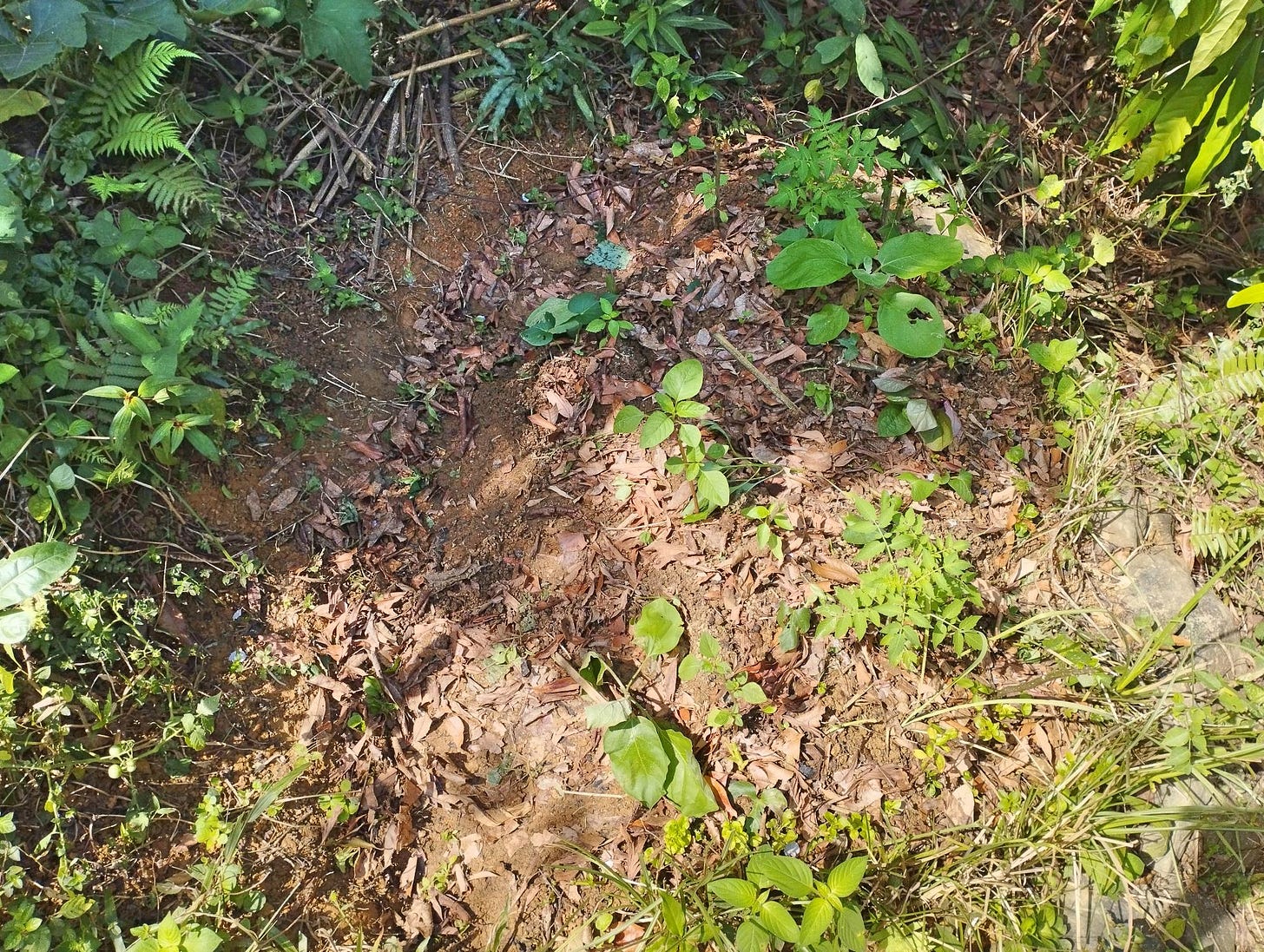
But that is the price you pay when you choose to become neighbors with some of the world’s remaining megafauna. For us, it is most certainly worth it. Even more so, we believe that our attitude and approach would reduce human-elephant conflict, if implemented by a larger part of the population here. Elephants tend to do the most damage when disturbed by humans, and in orchards in which the owners have eradicated all potential food – such as wild bananas, fishtail palms, or river tamarind (Leucaena). Contrary to popular belief, eliminating food sources does not mean that they visit a given area less frequently. Elephants are constantly on the move, and walk the same paths again and again. We believe that they understand very well what’s happening, and get frustrated when they find less and less food on each round trip through the valley. We would feel the same.
Moreover, we strongly believe that experiences like the one described above are absolutely fundamental to developing an ecological consciousness and a meaningful connection to – and relationship with – the Living World:
From time to time, we have to feel small.
Until fairly recently, this profoundly life-altering feeling of relative insignificance in the face of an entity much larger and more powerful than ourselves used to be a regular part of the human experience, for pretty much everyone. Sometimes it was dramatic, like a thunderstorm shaking the foundation of your hut and pulling on its roof, fresh bear tracks around the barn, or the low growl of a tiger nearby. Sometimes it was benign, like observing a herd of bison pass by, watching majestic landscapes or the night sky, or taking a walk among giant trees in an old-growth forest. Whether frightening or humbling – or both – our ancestors knew this feeling well. It shaped them and showed them their place in the Greater Scheme of Things.
More importantly, it periodically served to put us back in our place, sometimes forcefully, and thus curbing our inclination towards cosmic hubris.
When a people don’t have access to this feeling anymore (or when they only get that feeling when encountering man-made objects), they start believing that they are above the rest of the World and the unwritten laws that govern her – they start to think of themselves as better, more powerful, or otherwise superior to all other Life: that they themselves are like gods.
Anyone who has ever had a wild elephant circling their house knows better.7
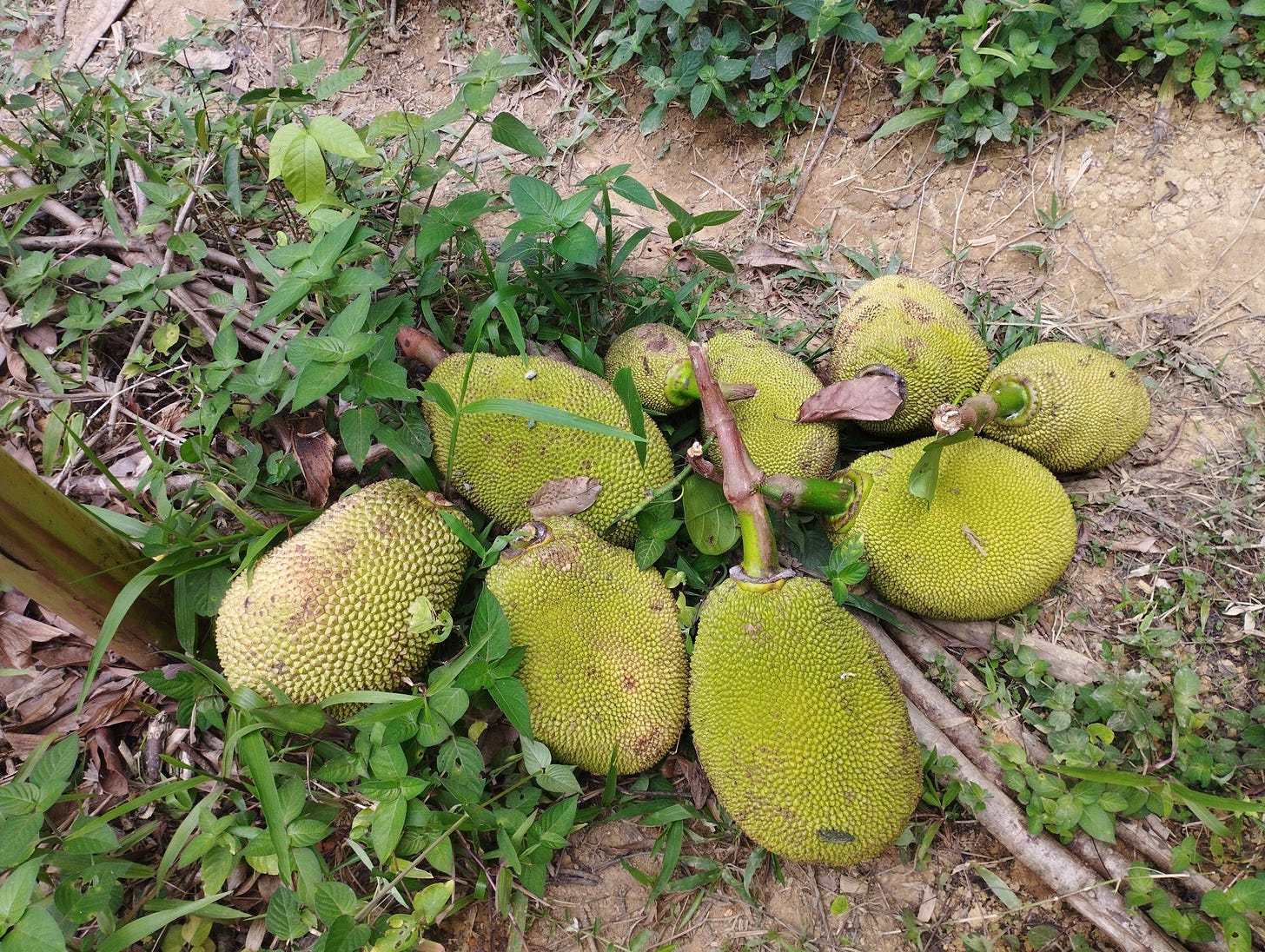
Somehow, Karn managed to get a bit more sleep after the elephant had left, but my night was over. As soon as it was bright enough, I went outside and inspected the damage:
two large limbs broken off the jackfruit tree (likely a result of frustration as most of the jackfruits dropped onto the road below, and thus out of reach),
half a vegetable bed flattened (luckily not the one with the cucamelons),
one tomato plant and one chili plant crushed,
one coconut palm,
and one fishtail palm.
Only the coconut palm will be dearly missed.
By some miracle, the earthen pot that the elephant knocked down didn’t even break.8 Any animal as massive as an adolescent elephant naturally makes a lot of noise, but each time we follow their tracks the next morning, expecting the worst, we are surprised by how extremely careful they are when walking through our garden.
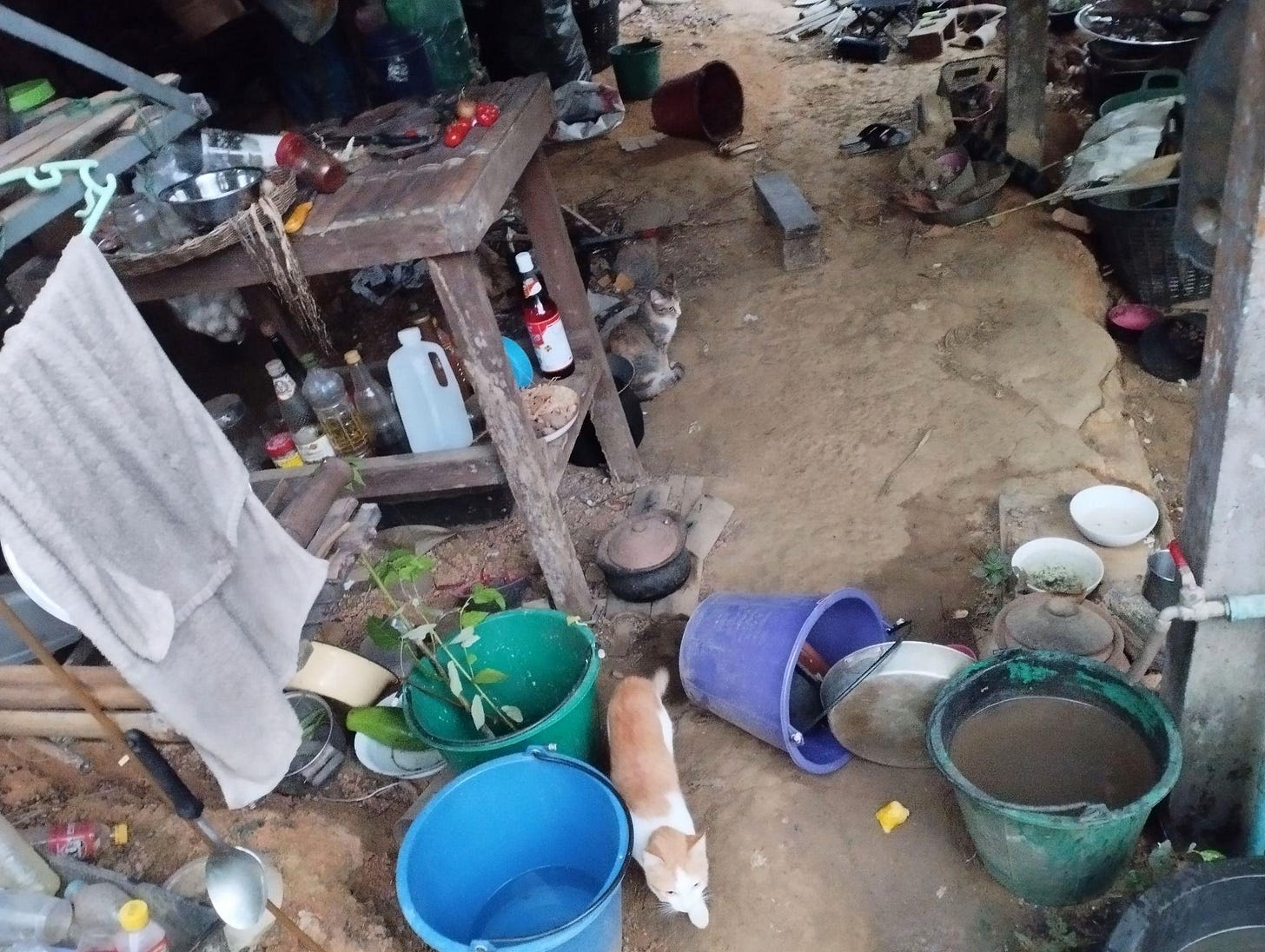
After half a day of chop-and-drop and another hour of mending the chicken fence, an unsuspecting visitor wouldn’t even have been able to tell that, just a few hours ago, an elephant walked right around our house and straight through our garden.
Through some curious twist of fate (and without prior knowledge of our nightly visitor!), two of our friends from the village below visited us on that very morning9 to bring us half a jackfruit (!!), and our neighbor dropped by with her two daughters later that same afternoon10 – the first time she visited our garden in the seven years we live here!
One might be tempted to think that this was all mere coincidence, but how boring would that be.
Hopefully the wide smile on our faces as we recounted the events of that remarkable morning will help them to understand that elephants are not our enemies, and that if we only show them some basic respect, they will most definitely reprocitate it.
They are so much smarter than we think.
A few years back, as a response to the madness going on around here during fruit season, we invented this certificate to officially certify products from our garden:
I write stuff like the above in my free time, when I’m not tending the piece of land we’re rewilding here at Feun Foo. As a subsistence farmer by profession I don’t have a regular income, so if you have a few bucks to spare please consider supporting my work with a small donation:
If you want to support our project on a regular basis, you can become a Patron for as little as $1 per month - cheaper than a paid subscription!
Further reading:
Just a month earlier, we had started putting ripe fruit into baskets or on the kitchen table (which is a bit higher), after a stray dog had looted bananas and pieces of jackfruit from our dining table repeatedly. From now on we will also have to factor in elephants when storing leftover fruit.
The Nature Reserve (เขตรักษาพันธุ์สัตว์ป่าคลองเครือหวาย) bordering our land stretches until the next province, and well across the border into Cambodia.
As with most other palms, the “heart” of the coconut palm is edible for us humans as well - and it is extremely delicious! But because nobody in their right mind (at least no human!) would kill a coconut palm just to get to the the tender shoot, it is colloquially called “millionaire’s salad.”
I was almost certain that I will have to rebuild the hanging shelf, because from the noise alone it sounded like it got damaged badly. But, as usual, the noise was a lot more dramatic than what had actually happened. The shelf is fine, just a few bowls and plates with drying seeds got knocked down.
He actually lit two firecrackers, but – as usual – way too late: the elephant had already disappeared into the bamboo forest.
For an examination of how conflict & trauma changes elephants’ behavior (and the surprising parallels to us humans), check out this episode of Fight Like An Animal: #13 - What elephants can teach us about civil war
If that feeling stems exclusively from fear, the response might actually facilitate hatred (and thus exacerbate further conflict), so another crucial ingredient to develop the ecological consciousness we so desperately need is reverence.
It landed in a plastic bucket standing beneath, which absorbed the shock. Only the lid shattered.
They were surprised to find us chopping up large branches of our favorite jackfruit tree, and initially thought that the tree was merely growing “too large” for our liking.
By that time, the only remaining evidence were the tattered remains of the coconut palm, and a fresh heap of elephant shit in front of our house.


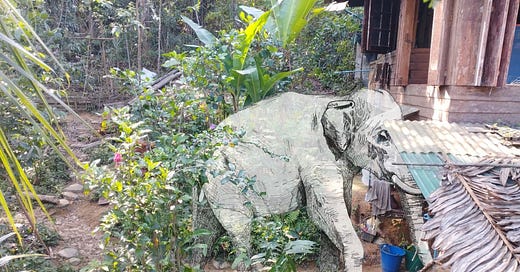



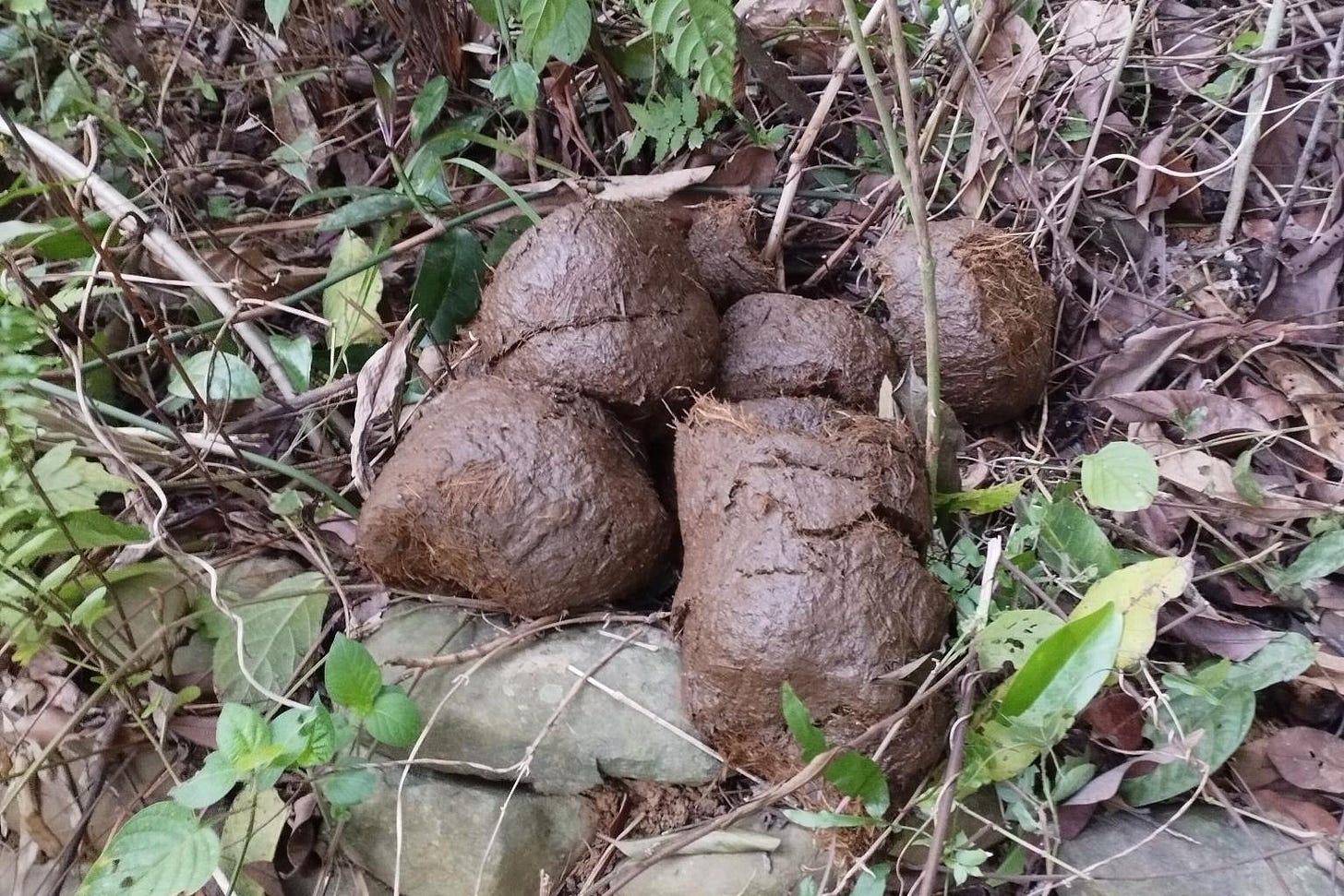
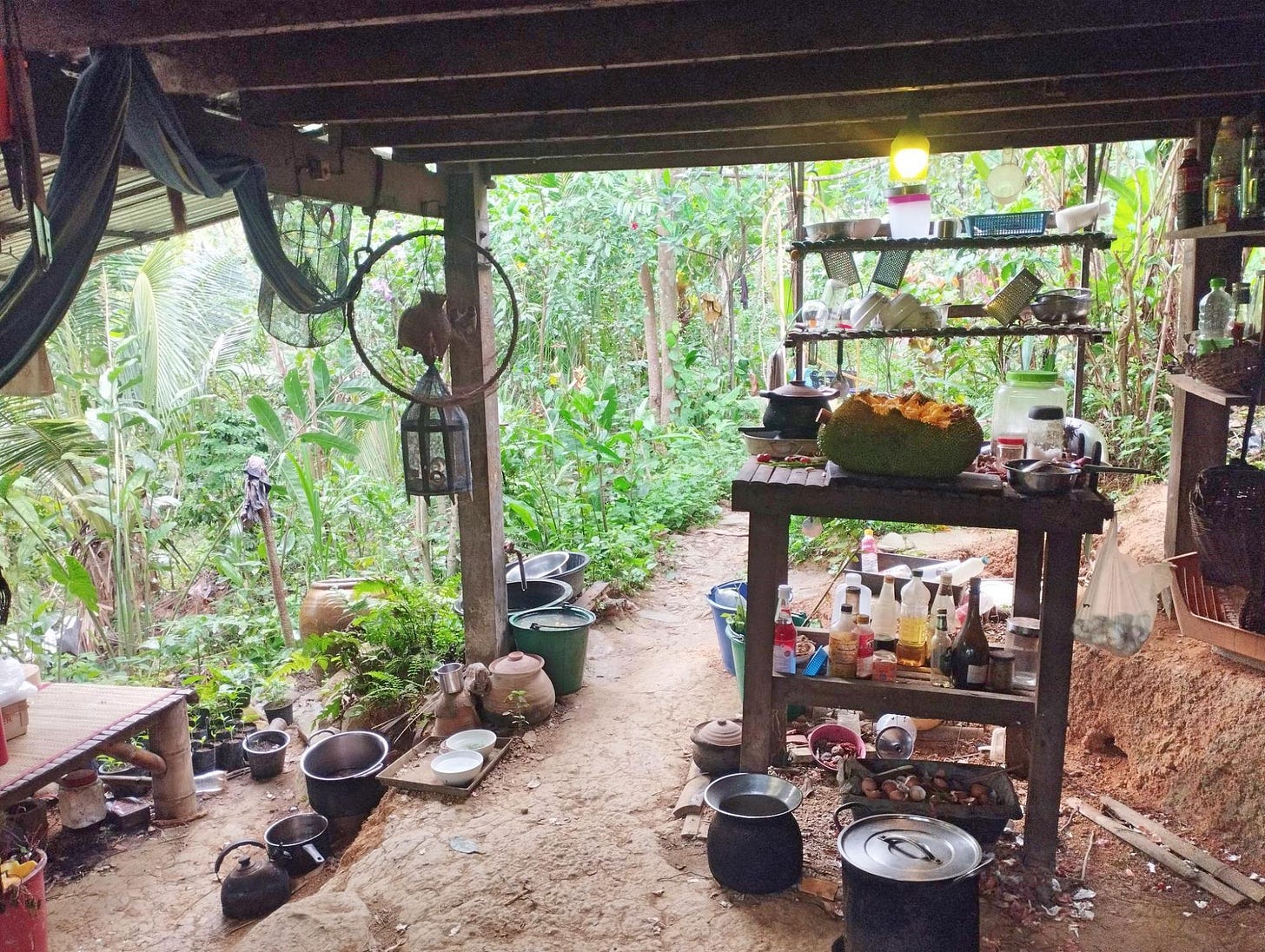
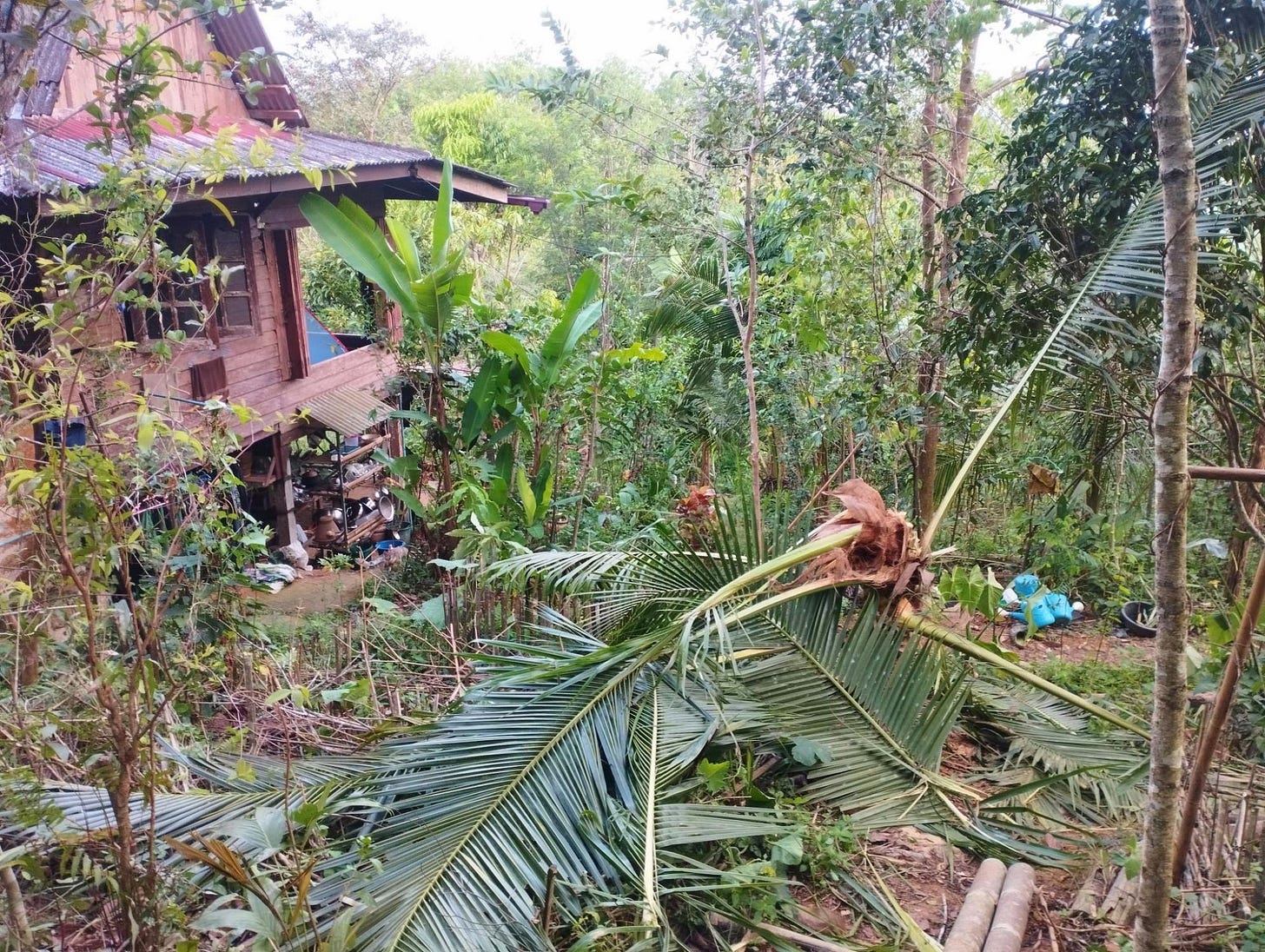
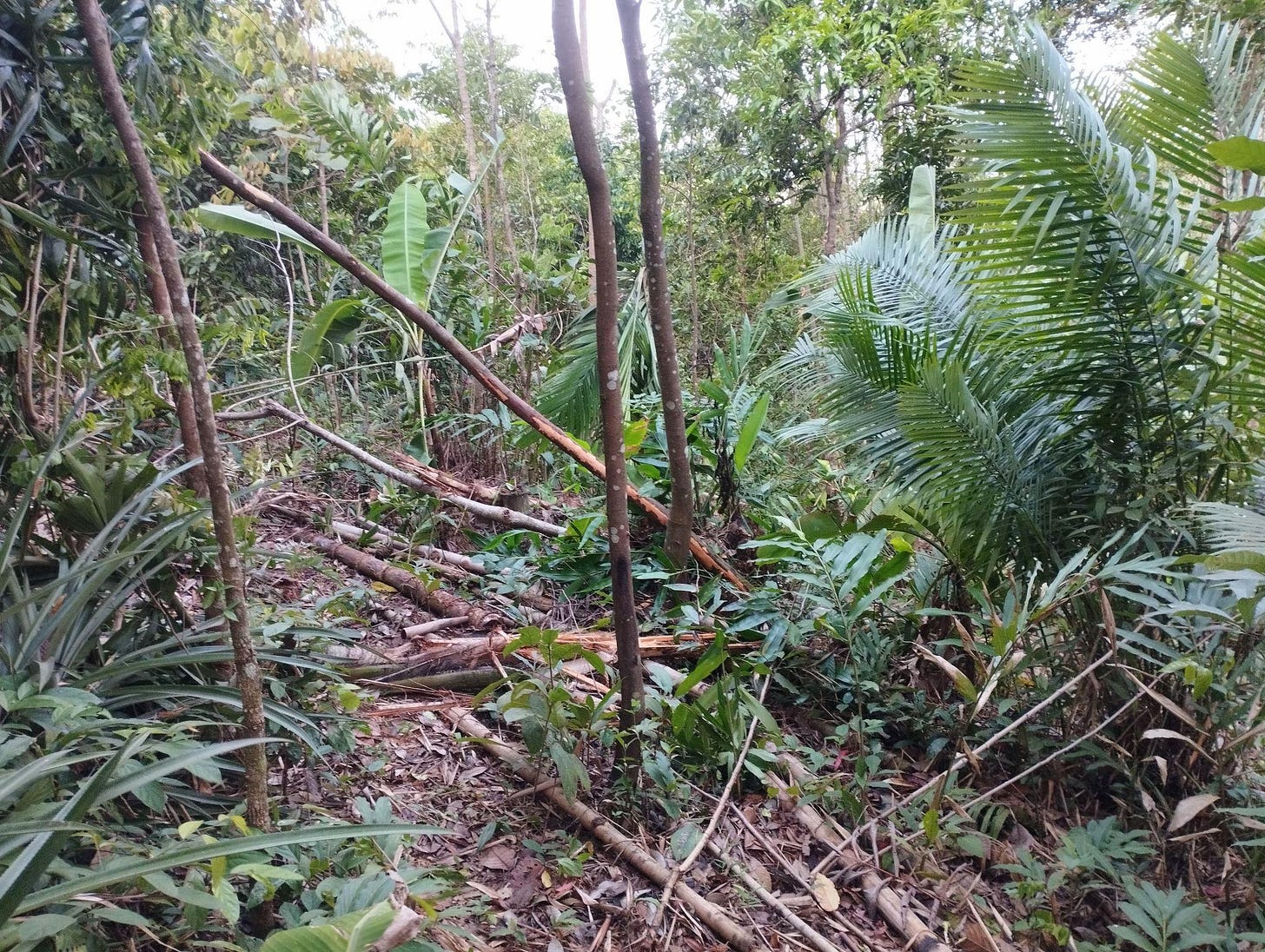
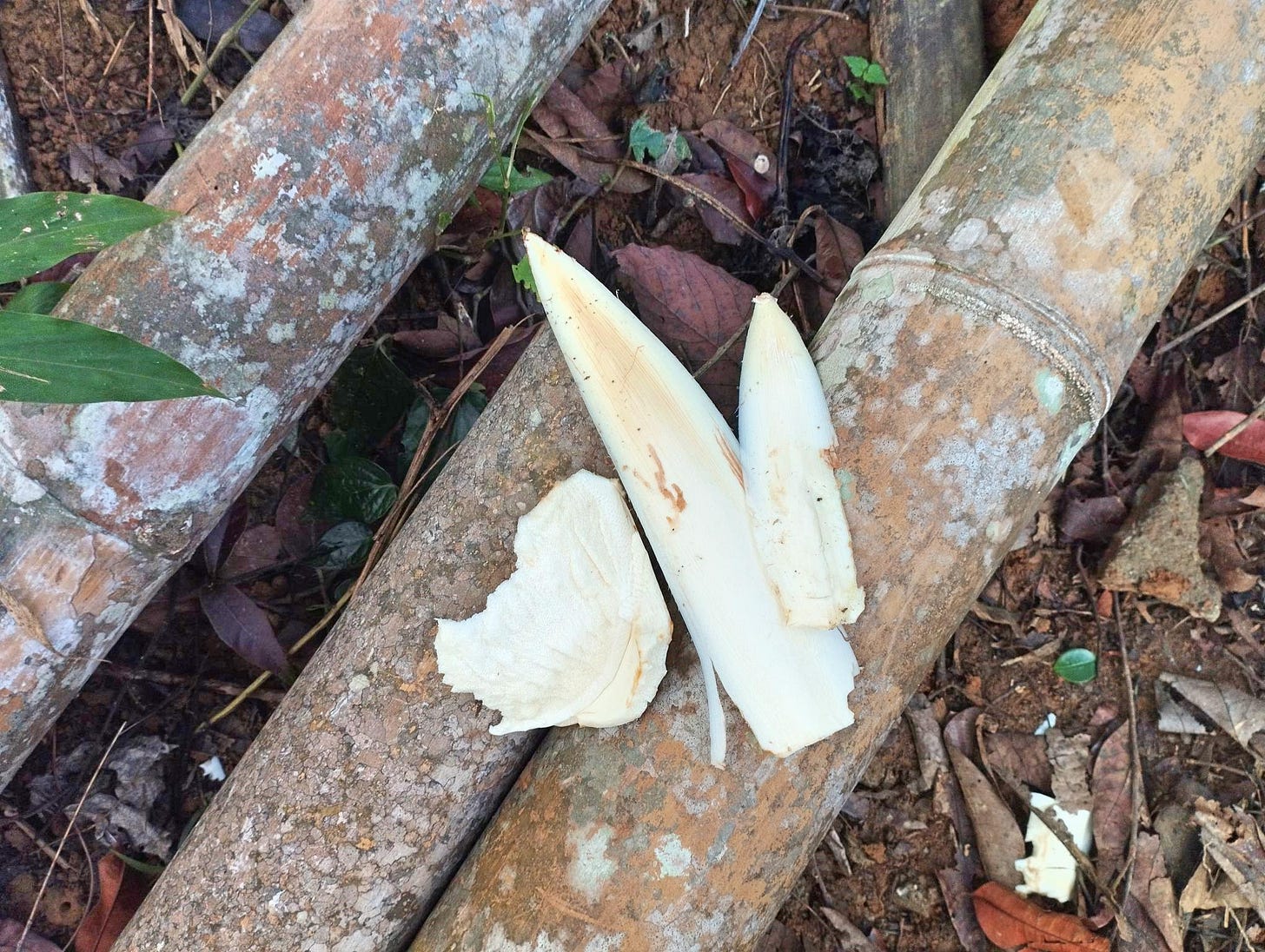

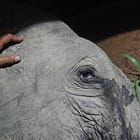
Wonderful story! My mind races with the opportunities for humans and elephants to come into closer harmony in the millennia that lie ahead.
Wow! Amazing story. I love them. It's so unfair that people push them out, then kill them for attempting to simply live.